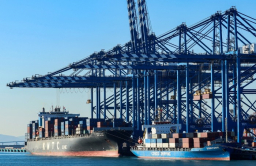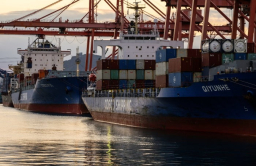-
KOSPI 2812.05 +41.21 +1.49%
-
KOSDAQ 756.23 +6.02 +0.80%
-
KOSPI200 376.54 +6.64 +1.80%
-
USD/KRW 1373 3.00 -0.22%
Liberal Lee Jae-myung wins election as South Korean president
Liberal Lee Jae-myung won 48.92% of votes, while conservative Kim Mon-soo secured 41.88% with 95.59% of votes counted
By
Jun 03, 2025 (Gmt+09:00)

South Korea’s liberal politician Lee Jae-myung has been elected the country's next president. Lee has pledged to revive Asia’s fourth-largest economy dampened by the US' protectionist moves and restore democracy and national unity amid a deepening political divide since ousted former leader Yoon Suk Yeol declared martial law last December.
Lee, the Democratic Party’s candidate, secured 48.92% of votes, while his conservative rival Kim Moon-soo had 41.88% with 95.59% of votes counted, National Election Commission data showed early on Wednesday.
The provisional voter turnout for Tuesday's snap presidential election was 79.4%, the highest turnout in South Korea since 1997. Turnout hovered around 77% in the last two presidential elections.
"From the moment I am officially confirmed as the president, I will devote all my energy to reviving the economy and restoring people’s livelihoods, as you have entrusted me to do. I will ensure that your painful lives are recovered as quickly and reliably as possible," Lee said in a speech.
"I will fulfill the mission of restoring democracy, building a society where the people are respected as sovereigns within a democratic republic, and where we live together in cooperation."
Lee was favored to win, according to polls announced a week before the election, forecast to beat Kim by 14 percentage points with 49% public support in a Gallup Korea survey, although the nominee for the People Power Party has narrowed an even wider gap projected at the beginning of the campaign on May 12.
CONCESSION
Kim conceded defeat in the election, saying he “respectfully accepts the choice of the people".
"Congratulations to Lee Jae-myung on his election victory,” he said.

The snap election was called as Yoon was removed from office by the country’s Constitutional Court in April after being impeached by lawmakers following his short-lived declaration of martial law last December. Yoon belonged to the People Power Party.
“Yoon’s martial law created a national consensus that the destruction of the constitutional order was unacceptable,” said Choi Chang-ryeol, a professor at Yong In University. “Lee drew support from young people and centrists in the Seoul metropolitan area by emphasizing democracy.”
Lee, who led the campaign to oust Yoon, is scheduled to take office on Wednesday without the usual two-month transition to serve a full five-year term.
CHILD LABORER TO PRESIDENT
Born to an impoverished farming family, Lee had to quit school and work as a child laborer at factories where he suffered injuries that left him with an arm disability.
He later passed the country’s exhaustive bar exam and became a human rights lawyer.
Lee previously served as the governor of Gyeonggi Province, the most populous region in South Korea, and as the mayor of Seongnam, which includes Pangyo – often referred to as South Korea’s Silicon Valley.
His popularity grew after fiery speeches critical of conservative President Park Geun-hye, who was also impeached, over a 2016-17 corruption scandal that went viral.
In January 2024, Lee was stabbed in the neck by a man who had written a manifesto saying he wanted to ensure Lee never became president.

TO SAVE ECONOMY
Lee takes office as the South Korean economy is faltering on weakening domestic demand and rising external headwinds.
The central bank last week lowered its 2025 economic growth forecast to 0.8% from the previous 1.5% announced in February.
Lee emphasized balancing economic growth and public welfare, promoting the slogan “The Era of KOSPI 5,000.” While other candidates set only targets for the country’s main stock index, Lee provided details, such as measures to protect minority shareholders, to achieve the goal.
“His image as someone focused on livelihoods drew support from working-class citizens,” said Shin Yul, a political science professor at Myongji University.
The Democratic Party has pledged to gradually increase budgets for research and development and invest heavily in artificial intelligence if Lee wins, starting with this year’s extra spending.
The party also plans to make defense one of the country’s key industries, provide vouchers to help local businesses and strengthen the country’s soft power by ramping up support for the content industry.
TO DEAL WITH TRUMP’S PROTECTIONISM
Lee, the advocate for pragmatic diplomacy, is expected to face immediate challenges due to US President Donald Trump’s unpredictable protectionist trade policies and conflict between the US and China, South Korea’s two largest overseas markets.
Washington is pressuring Seoul to abandon its longstanding strategy to focus on security with the US and the economy with China and instead choose one of them. The Trump administration is demanding that South Korea distance itself from China, Russia, and other countries considered threats to the global free trade system.
The US is predicted to put further pressure on South Korea as Lee takes office. Seoul has asked Washington to consider South Korea’s political situation to avoid sensitive matters regarding tariffs.
The Trump administration wants countries to provide their best offer on trade negotiations by Wednesday as officials seek to accelerate talks with multiple partners ahead of a self-imposed deadline of July 8, just five weeks away, Reuters reported.
South Korean industries are expected to be hit hard if the new government fails to make a deal by this deadline, experts said.
The Lee administration is likely to diversify export markets to reduce economic dependence on the US and China in the medium to long term.
Lee repeatedly emphasized the importance of exploring emerging markets such as Latin America, the Middle East and Africa.

FOREIGN POLICY
Lee plans to ease tensions with North Korea by first restoring a military hotline and a military agreement ditched by Pyongyang amid rising animosity in 2023.
He is also expected to maintain the goal of denuclearization on the Korean peninsula and the transfer of wartime operational control from the US.
South Korea is unlikely to avoid participation in US-led multilateral security frameworks, diplomatic sources said.
Lee needs to attend the upcoming North Atlantic Treaty Organization (NATO) Summit on June 24 to restore South Korea’s presence in multilateral diplomacy, which had lapsed under martial law, the sources said.
Failure to engage in discussions at the summit – particularly regarding responses to Russia-China security cooperation – could harm South Korea’s relationship with NATO member countries, especially the US, the sources added.
NATO has invited leaders from four Indo-Pacific countries, including South Korea, Japan, Australia, and New Zealand, in a bid to counter Chinese authoritarianism since 2022.
Write to Jongwoo Cheon, Hyung-Kyu Kim, Hyun-Il Lee, Dae-Hun Kim, Hyung-Chang Choi and Jae-Young Han at jwcheon@hankyung.com
Jongwoo Cheon edited this article.
-
May 29, 2025 (Gmt+09:00)
-
Apr 23, 2025 (Gmt+09:00)
-
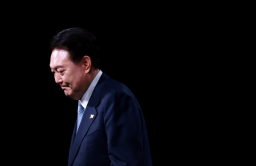 Business & PoliticsS.Korean President Yoon Suk Yeol ousted; new presidential election coming
Business & PoliticsS.Korean President Yoon Suk Yeol ousted; new presidential election comingApr 04, 2025 (Gmt+09:00)
-
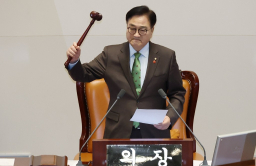 Business & PoliticsKorea’s president impeached over martial law; political turmoil to ease
Business & PoliticsKorea’s president impeached over martial law; political turmoil to easeDec 14, 2024 (Gmt+09:00)
-
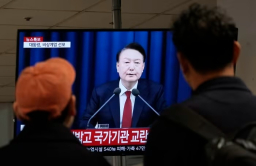 Business & PoliticsSouth Korea president to lift martial law after Parliament rejects move
Business & PoliticsSouth Korea president to lift martial law after Parliament rejects moveDec 04, 2024 (Gmt+09:00)


